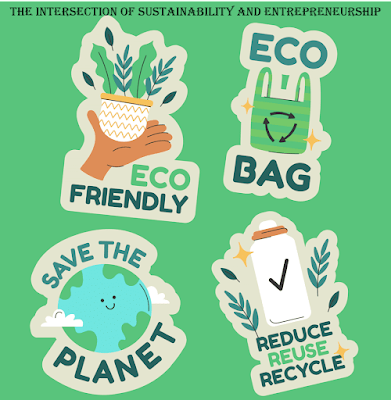The Intersection of Sustainability and Entrepreneurship
In this era of business disruption, there are several aspects that entrepreneurs needs to think about when creating and growing their startups. Some of the key aspects include but are not limited to: technology disruption, sustainability, people's safety, and growth strategies.
Today's entrepreneurs understand that success isn't just about profit; it's about creating a positive impact on the planet. This growing awareness is fueling a surge in businesses incorporating sustainable practices into their core operations.
 |
| The Intersection of Sustainability and Entrepreneurship |
Sustainable businesses operate with a triple bottom line in mind: People, Planet, and Profit.
Entrepreneurs are increasingly recognizing the importance of incorporating sustainable practices into their businesses to address environmental challenges, meet consumer demand for eco-friendly products, and drive long-term value. Here's how entrepreneurs are embracing sustainability and examples of eco-friendly startups leading the way:
Sustainable Supply Chains
Many startups are focusing on building sustainable supply chains by sourcing materials responsibly, reducing waste, and minimizing carbon emissions. Partnering with suppliers who prioritize ethical sourcing and environmentally friendly practices ensures a sustainable product lifecycle.
 |
| The Intersection of Sustainability and Entrepreneurship |
For example, Patagonia, a leading outdoor apparel company, prioritizes organic cotton, recycled materials, and fair labor practices in its supply chain, demonstrating a commitment to environmental and social responsibility.
Renewable Energy
Startups in the renewable energy sector are developing innovative solutions to harness clean energy sources and reduce reliance on fossil fuels.
Shifting to solar, wind, or geothermal power sources reduces reliance on fossil fuels and lowers carbon footprint. Tesla, the electric car pioneer, disrupted the auto industry with its focus on clean energy transportation.
 |
| The Intersection of Sustainability and Entrepreneurship |
Companies like Tesla Energy are revolutionizing the solar industry with solar panels, solar roofs, and energy storage systems, enabling individuals and businesses to generate and store their own renewable energy.
Circular Economy
Entrepreneurs are embracing the circular economy model, which aims to minimize waste and maximize resource efficiency by designing products for reuse, recycling, and remanufacturing.
For example, Loop is a startup that offers reusable packaging solutions for consumer products, allowing customers to refill containers instead of using single-use packaging.
Sustainable Food and Agriculture
Startups in the food and agriculture sector are developing sustainable alternatives to traditional farming practices and animal products.
Beyond Meat and Impossible Foods are leading the plant-based meat revolution, offering environmentally friendly alternatives to conventional meat products that require fewer resources and produce fewer greenhouse gas emissions.
Waste Reduction and Recycling
Startups are tackling the issue of waste reduction and recycling by developing innovative technologies and business models to repurpose materials and divert waste from landfills.
 |
| The Intersection of Sustainability and Entrepreneurship |
For example, Terracycle is a company that specializes in recycling hard-to-recycle materials and offers collection programs for items like cigarette butts, coffee capsules, and plastic packaging.
Sustainable Fashion
Entrepreneurs in the fashion industry are pioneering sustainable fashion brands that prioritize ethical sourcing, eco-friendly materials, and transparent supply chains. For example, Reformation is a sustainable fashion brand that focuses on using recycled and deadstock fabrics, minimizing water waste, and offsetting carbon emissions to create stylish and environmentally conscious clothing.
The growing market for sustainable products and services reflects shifting consumer preferences and increased awareness of environmental issues. Entrepreneurs who prioritize sustainability in their business practices not only contribute to positive social and environmental impact but also capitalize on emerging market opportunities and build brand loyalty among environmentally conscious consumers.
As sustainability continues to gain momentum, innovative startups will play a crucial role in driving forward sustainable solutions and shaping a more environmentally sustainable future.
Eco-Warriors: Inspiring Examples of Sustainable Startups
- Beyond Meat: This company offers plant-based alternatives to meat products, catering to the growing demand for sustainable food options.
- Veja: This footwear company uses organic cotton and wild Amazonian rubber to create stylish and eco-friendly sneakers.
- The Humble Co.: This startup offers sustainable personal care products packaged in recyclable materials, promoting plastic alternatives in the bathroom.
These are just a few examples, but they showcase the diverse range of industries embracing sustainability.
The Rise of the Conscious Consumer: A Booming Market
Consumers are increasingly prioritizing sustainability when making purchasing decisions. Studies show a growing willingness to pay a premium for eco-friendly products and services. This trend presents a significant opportunity for businesses that can demonstrate their commitment to environmental responsibility.
Capitalizing on the Green Wave: Key Takeaways
Entrepreneurs who can effectively integrate sustainability into their business models are well-positioned for success in today's market. Here are some key takeaways:
- Understand Consumer Preferences: Stay informed about evolving consumer trends and the growing demand for sustainable options.
- Embrace Transparency: Communicate your sustainability efforts openly and honestly to build trust with eco-conscious consumers.
- Innovation is Key: Continuously seek new ways to minimize environmental impact and create sustainable products and services.
Sustainability is no longer a niche concern; it's a core business consideration. By prioritizing the planet along with profit, entrepreneurs can build successful ventures that contribute to a greener future. As the market for sustainable products and services continues to expand, those who embrace eco-conscious practices will be well-positioned to lead the way.
